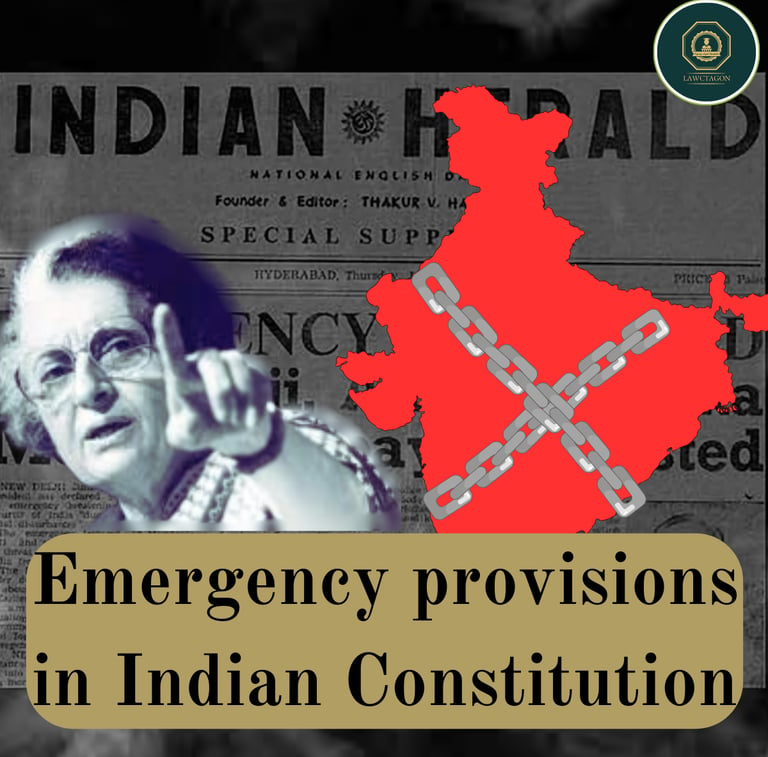Analyzing the Emergency Provisions of the Indian Constitution
In this blog, the complex topic of emergency provisions in the Indian Constitution is explained. Covering national, state, and financial emergencies, it delves into their legal bases, procedures, and impacts. Case laws such as Minerva Mills and ADM Jabalpur are discussed to illustrate judicial review.
Bhawna
7/3/20244 min read


Introduction
Today, it has been 49 years since the emergency was imposed in India by the then-Prime Minister Indira Gandhi. It becomes imperative for us to understand the history of that period as a citizen of this democratic nation and to know the important provisions given under our constitution. The word “emergency” can be described as an unexpectedly occurring situation that causes public authorities to act instantly within their particular purpose. Emergency provisions are given under Articles 352 to 360 which is part XVIII of the Indian Constitution.
There are basically three types of emergencies as per our Constitution.
1) National Emergency which is provided under Article 352.
2) State Emergency which is provided under Article 356 and
3) Financial Emergency which is provided under Article 360.
The president can impose all these emergencies.
1. National Emergency
National emergency is provided under Article 352 of our constitution. It could be declared due to war, external aggression or armed rebellion. When an emergency is declared due to armed rebellion then it is also known as internal disturbance. It was imposed in 1975 when Indira Gandhi was in power.
Procedure for the proclamation of emergency
A national emergency can be proclaimed by the president only after receiving advice from the cabinets.
Parliamentary approval
44th Constitutional Amendment has reduced approval for emergencies from 2 months to 1 month. A proclamation of emergency must be approved by both houses in one month. It will remain in existence for 6 months and if one wants further extension then again approval of parliament is needed. If case Lok Sabha is not in session then it has to be approved by the Rajya Sabha and when the next session of Lok Sabha starts then from the Lok Sabha.
Revocation of Emergency
Emergency can be revoked by the President at any time without the approval of Parliament.
The President must revoke the proclamation if the Lok Sabha passes the resolution disapproving the continuation of the emergency.
If wanted continuation of the proclamation, then a resolution must be passed by both houses.
Case Laws
In Minerva Mills vs Union Of India
It was held that for determining the validity of a proclamation of emergency, there can be no bar to judicial review. The court can check whether the President's satisfaction is on valid grounds or not.
In Makhan Singh vs State of Punjab2
During the Indo-China war, an emergency was proclaimed and the validity of suspended rights (14,21 and 22) was challenged. It was held that the rights of the legally detained person were suspended and not of the illegally detained person.
In ADM Jabalpur vs Shiv Kant Shukla3
It was held that during an emergency, the right to life and personal liberty could be suspended.
However, this judgment was criticized. This case was overruled in the case of KS Puttaswamy vs Union of India where the right to privacy was recognized as a fundamental right. This case is also known as the Habeas Corpus Case.
Effect of National Emergency
a) During an emergency, the power gets accumulated with the union government.
b) Parliament come up with the legislative power which is the law-making power of the state.
c) Distribution of funds changes at the time of emergency.
Will it impact our Fundamental Rights?
All our fundamental rights e.g. Right to Equality before the Law, Freedom of Speech and Expression, freedom to assemble peacefully, freedom to practice any profession, trade, religion etc. and the right to challenge them may also be suspended but there is one exception to this provision i.e. Article 20 and 21.
2. State Emergency
It can also be referred to as the president's rule. In this case union government take the charge of state. It arises due to the failure of constitutional machinery by the state govt.
Imposition grounds
A situation arises when the governor can't perform his duties of state government. Then the president imposes an emergency. Article 356 has provisions regarding this. Article 365 provides that when a state fails to follow the directions of the central government, then also president can declare the situation of emergency.
Parliamentary approval
After the imposition of the president's rule, approval of both houses of parliament is a must within 2 months. If Lok Sabha is dissolved during these 2 months then if after 1 month Lok Sabha makes its sitting, Lok Sabha has to give its approval otherwise it will cease. The maximum period of state emergency is 3 years.
The 44th Amendment has added that parliament cannot extend its proclamation beyond one year.
Revocation
Parliament's approval is not needed for revocation. The President can himself revoke a state emergency. If they don't want to revoke the proclamation then some conditions need to be fulfilled which are provided under 356(5).
In SR Bommai vs UOI4
It was held that the President could use power only after the approval of parliament, until then it could suspend only the Legislative Assembly. If the state governor works against secularism then the president's rule can be imposed.
Effects of President's rule
1 Any authority can be dismissed by the President at his wish.
2 Dissolution of the State legislature
3 Parliament gains all the functioning of the state legislature.
3. Financial Emergency
Till now, no financial emergency has been imposed in our country. Article 360 speaks for the financial emergency.
Imposition
If the country's financial stability is threatened, then the President can declare a financial emergency.
Parliamentary approval
Within 2 months from the date of issuance, it should be approved by both houses of Parliament.
Revocation
There is no need for parliamentary approval. The president can revoke it at any time.
Effects of Financial Emergency
1 Centre has direct control over state financial matter
2 Centre may reduce salaries of persons working under state government
3 Even the salaries of judges of the High Court may be reduced by the President.
Conclusion
Emergency is invoked at the time of disturbances whether it's internal or external. It sometimes is seen as a dictatorship but when we go through the process of imposition and parliamentary approval, then it becomes clear that the President do not hold absolute power in this regard and it saves the federal form of government which is seen as unitary at the time of emergency.
References
{1} (1980) 2 SCC 591
{2} 1964 AIR 381,1964 SCR (4) 797
{3} (1976) 2 SCC 521
{4} AIR (1994) SC 1918
{5} Constitution of India, 1950.


